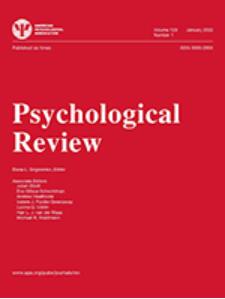Infant attachment as intentional action: An ideomotor and event-coding approach on the ontogenetic emergence of attachment.
IF 5.8
1区 心理学
Q1 PSYCHOLOGY
引用次数: 0
Abstract
Attachment plays an important role in human development. It relates to various aspects of psychosocial functioning. Yet, the psychological basis of the ontogenetic emergence of attachment is unclear. Following attachment theoretical considerations, I propose that the emergence of attachment needs to be understood in terms of the development of intentional action. Specifically, I propose that ideomotor learning provides a plausible cognitive basis for the emergent goal-directed nature of attachment behavior. This framework explains how attachment emerges in the first instance and how different patterns of attachment are grounded in the dynamics of perception and action in the social world. The article discusses how ideomotor learning provides the basis for infants' learning about the predictability of caregiver responses and how it results in individual differences in the sense of agency. Relying on recent advancements of ideomotor theorizing, I discuss that the early experiences result in event files-integrated patterns of feature codes that bind distributed stimulus and action features-that form the basis of attachment representations. Overall, this account provides a novel framework that helps to understand how attachment emerges as a form of intentional action. (PsycInfo Database Record (c) 2025 APA, all rights reserved).作为意向行为的婴儿依恋:依恋个体发生发生的意识运动和事件编码方法。
依恋在人类的发展中起着重要的作用。它涉及到社会心理功能的各个方面。然而,个体发生性依恋产生的心理基础尚不清楚。根据依恋理论的考虑,我提出依恋的出现需要从意向行为的发展角度来理解。具体地说,我认为意念运动学习为依恋行为的紧急目标导向性质提供了一个可信的认知基础。这个框架解释了依恋最初是如何产生的,以及不同的依恋模式是如何建立在社会世界中感知和行动的动态基础上的。本文讨论了意识形态运动学习如何为婴儿学习照顾者反应的可预测性提供基础,以及它如何导致代理感的个体差异。根据最近思想运动理论的进展,我讨论了早期的经验会导致事件文件——特征代码的集成模式,将分布式刺激和动作特征结合起来——形成依恋表征的基础。总的来说,这个解释提供了一个新的框架,有助于理解依恋是如何作为一种有意行为的形式出现的。(PsycInfo Database Record (c) 2025 APA,版权所有)。
本文章由计算机程序翻译,如有差异,请以英文原文为准。
求助全文
约1分钟内获得全文
求助全文
来源期刊

Psychological review
医学-心理学
CiteScore
9.70
自引率
5.60%
发文量
97
期刊介绍:
Psychological Review publishes articles that make important theoretical contributions to any area of scientific psychology, including systematic evaluation of alternative theories.
 求助内容:
求助内容: 应助结果提醒方式:
应助结果提醒方式:


